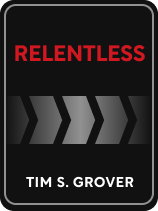

This article is an excerpt from the Shortform book guide to "Relentless" by Tim Grover. Shortform has the world's best summaries and analyses of books you should be reading.
Like this article? Sign up for a free trial here .
What is relentless support? Why is it important to build relationships with people who will do nothing but motivate you?
Relentless support is given by people who not only want to see you become better, but also want to be better themselves. Tim Grover says in Relentless that these people can be a good influence on your life by being honest with you and holding you accountable.
Keep reading for the importance of knowing relentless people and how their mindset can rub off on you.
Surround Yourself With Relentlessness
One of Grover’s methods for seeking constant improvement is to surround yourself with relentless support. These people help you improve by offering accountability and honesty that you can’t get from non-relentless people. Below, Grover explains why accountability and honesty are necessary for relentlessness, as well as why only relentless people can offer them.
Accountability
Due to the high pressure that comes from being unstoppable, you’ll sometimes feel tempted to give up or take the easy route. But the relentless people around you will make sure you stay the course and continue giving everything you have—they understand what success requires and will hold you accountable to that standard. This accountability means recognizing where you can put more effort in and pushing you to do so. On the other hand, non-relentless people don’t understand how important total commitment is or might be uncomfortable with pushing you harder, so they can’t offer this accountability.
Organizing Your Relentless Support
For practical advice on what kind of relentless people you should surround yourself with, look to Jack Canfield’s The Success Principles. Canfield recommends creating three categories of collaborators, each fulfilling a different role:
- Achievement group: Make an achievement group of five or six people and meet with them to discuss how you’ll accomplish your goals. This group can be personal or professional, and can relate or not relate to your field—what’s important is that everybody works towards a shared purpose and provides each other with new perspectives and resources.
- Accountability partner: Have one accountability partner, and meet regularly with them to make sure you’re both doing the work necessary to reach your goals.
- Support team: A support team consists of experts dedicated to helping you excel in your field. Meet with members of your support team regularly in a one-on-one setting.
Honesty
Another thing you’ll find with relentless support is honesty. Relentless people will be honest with you, giving you a reality check when you need it. Honesty is crucial for improvement because it’s how you learn what needs improvement and how you can improve on it. Relentless people don’t care about offending or upsetting others while pursuing success, and so they’ll tell you exactly what you need to hear. This could mean telling you what you do poorly, why you do it poorly, or how to stop doing it poorly. Non-relentless people can’t offer the same level of honesty, because the fear of being offensive or upsetting holds them back.
Using Feedback Well
While Grover recommends improving by surrounding yourself with people who give relentless support and honest feedback, Douglas Stone and Sheila Heen (Thanks for the Feedback) argue that receiving feedback well is even more important for improvement. They recommend a three-step process that can help you receive feedback well.
Avoid trying to prove that the feedback is “wrong.” If you do this, you’ll automatically dismiss what they say and won’t look for ways you could improve.
Instead of looking for what’s wrong, look for what’s different between your perspective and theirs. Consider why the two of you might have different perspectives, without dismissing either one.
Start looking for what’s right about the feedback—points you agree on or lessons you can learn from it. Even if you disagree with the feedback giver, you still might find they have valuable insight on areas where you can improve.

———End of Preview———
Like what you just read? Read the rest of the world's best book summary and analysis of Tim Grover's "Relentless" at Shortform .
Here's what you'll find in our full Relentless summary :
- The qualities you’ll need to become the best in your field
- Why sacrifices and discomfort are necessary for growth
- Why you should practice indulging in your primal self






